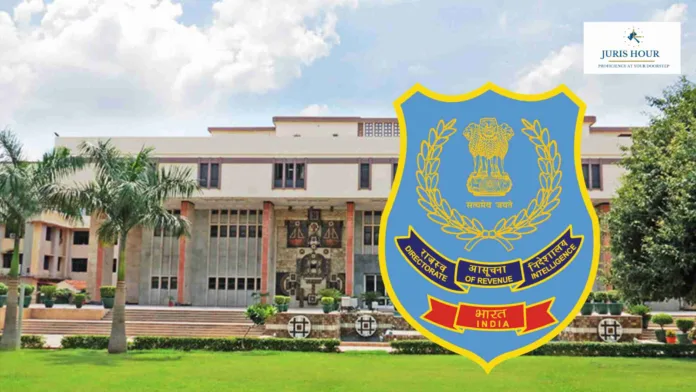The Delhi High Court has held that Section 110(1B) of the Customs Act does not empower magistrate the authority to order the Directorate of Revenue Intelligent (DRI) to initiate a fresh revaluation of smuggled goods at the preliminary stage.
The bench of Justice Sanjeev Narula while setting aside the revaluation order passed by the Magistrate observed that the directions for revaluation were issued in the criminal proceedings at a stage when no complaint had yet been filed by the DRI and the investigation was still underway. In the absence of any specific power conferred either under the Customs Act or the Code of Criminal Procedure to order revaluation during investigation, and particularly after the conclusion of quasi-judicial adjudication on the same subject, the Magistrate, exceeded the permissible limits of jurisdiction.
The petitioner, Directorate of Revenue Intelligence (DRI) has challenged the order passed by ACMM, to the extent that it directs revaluation of the smuggled goods.
Harsh Vasant and Moolchand Sharma, were arrested by DRI officers, Delhi Zonal Unit, for offences under Sections 132 and 135 of the Customs Act, 1962, in relation to the smuggling of 5010 bottles of foreign liquor, allegedly concealed within a consignment of foodstuff and beverages, imported under Bill of Entry. The arrested persons were produced before the Duty Magistrate on the same date and were remanded to judicial custody. Subsequently, they were granted bail subject to certain conditions.
The accused filed an application before ACMM, seeking revaluation of the goods. DRI filed a reply opposing the request. However, the application for revaluation was allowed by the ACMM.
DRI contended that the ACMM has fell into a grave error in directing revaluation of the goods. He submits that such a direction effectively amounts to conducting an investigation, a function beyond the remit of a Magistrate, particularly once the question of valuation stood adjudicated by a competent quasi- judicial authority after conclusion of investigation, issuance of show cause notice, and hearing of the parties.
DRI argued that the ACMM committed grave error in directing revaluation of goods through Appraiser in terms of “International Market Value’. Attention, in this behalf, is invited to the Section 135 (1) (i) (A) of the Customs Act, 1962, which talks of “market price”. Attention is also invited to Section 2 (30) of the Customs Act, 1962 which defines market price as “market price”, in relation to any goods, means the wholesale price of the goods in the ordinary course of trade in India;”
The accused contended that no interference is warranted. He submits that the valuation originally recorded in the panchnama, approximately INR 1 crore, was subsequently scaled down by the DRI itself to INR 87 lakhs, during the bail proceedings, ostensibly due to revised rates applied by duty-free shops. Meanwhile, accused had produced bills from a DSIDC outlet reflecting the market value of the seized goods as approximately INR 23 lakhs. The sharp downward revision of INR 13 lakhs within two days, it is urged, exposes the arbitrary and mechanical nature of the DRI’s valuation exercise.
The respondent accused relied on data from the National Information Data Base (NIDB) which indicated the international transaction value of the seized liquor to be approximately INR 22.96 lakhs.This data conclusively demonstrates that the DRI’s valuation grossly inflated the real value of the goods and lacked any defensible basis in the Customs Valuation (Determination of Value of Imported Goods) Rules, 2007.
The court noted that the power to direct a revaluation is necessarily incidental to the Court’s obligation to ensure that the evidentiary material placed before it is both authentic and reliable. Without such powers, the effective exercise of express statutory functions would be rendered meaningless.
The court clarified that Section 110(1B) of the Customs Act empowers a Magistrate to certify the inventory and the description of the goods seized, thereby facilitating evidentiary purposes at trial. However, this provision cannot be stretched to confer upon the Magistrate the authority to order a fresh revaluation of goods at the preliminary stage.
The court held that insofar as the certification proceedings under Section 110(1B) of the Customs Act are concerned, if the same have not yet been concluded, the Court directs that they shall now be conducted expeditiously and preferably completed within a period of three months.
Case Details
Case Title: DRI Versus Swaraj International
Case No.: CRL.M.C. 671/2013 & CRL.M.A. 2187/2013
Date: 13/05/2025
Counsel For Petitioner: Satish Aggarwala, Senior Standing Counsel
Counsel For Respondent: . Ramakant Gaur, Ms. Sneha Arya, Ms. Harshi Gaur, Ms. Meenakshi Sahu, Ms. Roopini Nandan and Ms. Sobiya Manzoor
Read More: Telangana State Pollution Control Board Exempted From Income Tax: CBDT

